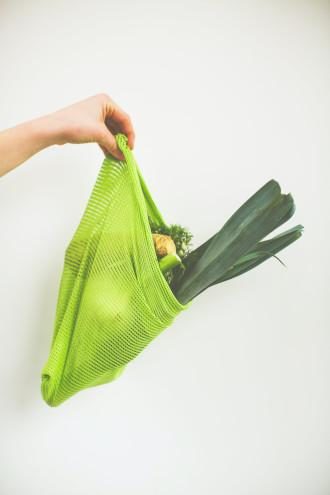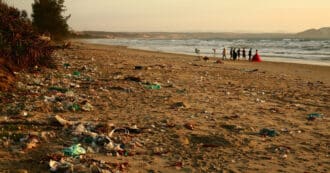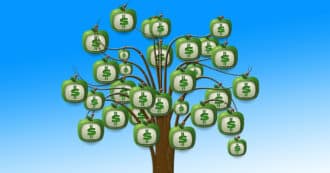By Ilana Stein – Today there is an extra element to the grocery shopping list: don’t forget to take your reusable grocery bags!
A History of Plastic Bags
Plastic bags were originally invented in order to help save the environment. Until the 1960s, paper or cloth shopping bags were used to pack produce or groceries in at the grocery store. However, paper bags are made from wood pulp, and forests were being destroyed to create them. Swedish engineer, Sten Gustaf Thulin, designed a one-piece plastic bag from a useful chemical substance called polyethylene which had been invented by accident in 1933.
It still took many years before they became cheaper and grocery stores began to stock them as free produce bags. By the 1980s, plastic bags had almost entirely replaced paper bags – in fact, such was the glut, that shoppers would take more empty ones when they shopped, ‘just in case’!
Plastic bag production carries a lower environmental cost than other bags, where less carbon and other harmful by-products are released during production. However it is what happens afterwards that is the issue: most are used once and then thrown away. They are not biodegradable, filling landfills, endangering wildlife, clogging drainage systems and eventually breaking up into microplastics – in other words, microscopic pieces which are now found in the soil, rain and air.
According to The World Counts, “Plastic will only start degrading after 700 years and will only fully degrade in 1000 years”.
Today’s Throwaway Society
We live in a throwaway society and much of what we throw away is made of some sort of plastic. The aim is to become aware and then begin to act.
The Great Pacific Garbage Patch
In 1997, researcher Charles Moore discovered an enormous ‘island’ floating in the Pacific, made of plastic waste. Moreover, plastic had gotten into everything including causing the death of wildlife and clogging drainage systems and rivers. Despite the obvious damage being done, according to UNEP, in 2018, plastic bags were being produced “at a rate of up to one trillion bags per year”.
Reducing The Production of Plastic Bags
Countries have begun to enact legislation by placing bans or taxes on thin, single use plastic bags in an effort to reduce the amount of plastic waste and marine litter. Now grocery shopping is best done with reusable bags.
Reusable Grocery Bags
There are different types of bags to use at the grocery store, from paper to cotton bags.
A Paper Grocery Bag
Paper bags, with reinforced bottoms, are biodegradable and can be used in composting. But producing these uses a lot of energy as well as chemicals and other substances which cause harm to the environment – to say nothing of the trees that are cut down to produce them. However, they are the easiest bags to recycle; in 2018, over 60% of paper used in the US ended up being recycled.
Reusable Grocery Bags
Cotton bags are fashionable and machine washable, but the environmental cost to make them – the amount of water and energy needed – is very high. Each one must be reused hundreds of times before they become environmentally friendly.
Synthetic fibers are also used to make reusable grocery bags. These include polypropylene (PP), polyester or nylon – which are all durable, often colourful and fun. PP shopping bags are those that are available at grocery stores. They are not necessarily biodegradable but are still more eco-friendly than plastic bags.
Nylon and polyester reusable bags are durable and fashionable, but they’re made of petrochemicals and thermoplastic which require much more energy to produce than cotton produced bags.
The best reusable bags on the market currently are recycled PET bags. These grocery bags are made from recycled materials such as water bottles and other plastic containers. In this way, there is little waste in creating a useful and reusable bag, giving it the lowest environmental footprint.
Religion and Reducing Usage of Plastic Bags
Religious leaders have come on board to help reduce the plastic that plagues our Earth. For example, in Indonesia – one of the largest contributors to marine plastic waste – two of the largest Islamic organizations in the country, Nahdlatul Ulama (NU) and Muhammadiyah, are encouraging their some 100 million followers to reuse their plastic bags. This shows the power of using religion to fight plastic usage to affect change on the national and local level; Indonesia aims to cut plastic waste by 70% by 2025.
“In the past we had more environmentally friendly practices and used traditional bags. We want people to return to that, to the times of their grandmothers when people would go out and not use so much plastic” (Fitri Aryani, 2018). Using reusable bags is not an innovation but rather a return to the ways of our ancestors. By helping us return to our roots, religions can catalyze the creation of a more sustainable world.
A Law Against Wasteful Destruction
In the Bible, there is a law called “bal tashchit” (Deuteronomy 20:19) – saying: “do not needlessly destroy” fruit trees. The Talmud and commentaries explain that this applies to all objects: “And likewise not to do any damage – such as burning or ripping a garment or breaking a vessel for no reason” (Sefer Hachinuch, law 529). The reason for this law is:
… in order to teach our souls to love good and benefit and to cling to it…. And this is the way of the pious … they love peace and are happy for the good of the creatures and bring them close to Torah, and they do not destroy even a grain of mustard in the world. And they are distressed by all loss and destruction that they see; and if they can prevent it, they will prevent any destruction with all of their strength.
While there are many options of reusable bags, which can be confusing, the rule of thumb is – reduce the number of bags, reuse them as often as possible, and in that way, we can help cut down on plastic waste.
The best reusable grocery bags then are ones that we use mindfully, aware of our impact on the Earth.
* Featured image source









The article is really interesting. The topic of caring for the environment is very important. Using reusable grocery bags and looking for ways to make these bags from ecological material are actions that have reduced pollution. However, we forget the negative impact that supermarket packaging has.
Shopping at the supermarket is one of the most common activities that we all do.For example, a few days ago while I was shopping in the produce area .I stopped when I saw a perfectly peeled orange, packaged in a plastic box and displayed on the supermarket shelf. So I asked myself the following questions: Are we so lazy that we can’t chop our own fruit? Besides , what implications does the use of these boxes have on the environment?The materials used as packaging aren’t recycled and take a lot of years to decompose. So, it leads me to the conclusion that we buy more garbage than food and we consume more plastics than fruits.
What can we do about it? I think it’s important that the authorities develop regulations that regulate these actions of supermarkets. On the other hand, as citizens we have the responsibility to avoid actions that damage our planet.